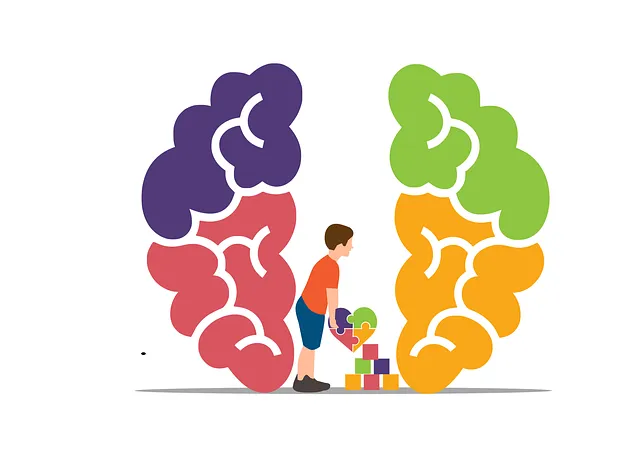The Littleton Kaiser Permanente Behavioral Health Center integrates Positive Thinking Exercises (PTEs) into its mental wellness programs, empowering individuals with cognitive reframing, gratitude practices, and affirmations to challenge negative thoughts. These exercises focus on Mind Over Matter principles, building resilience, enhancing emotional intelligence, and improving life satisfaction. Guided by dedicated therapists in a supportive environment, PTEs foster long-term positive thinking as a sustainable lifestyle choice. This approach alleviates stress, anxiety, and improves communication skills, leading to enhanced patient satisfaction and streamlined healthcare operations. The center strategically incorporates mindfulness, positive affirmations, cognitive reframing, self-care routines, and trauma support services for holistic well-being.
At Littleton Kaiser Permanente Behavioral Health Center, positive thinking exercises have emerged as a powerful tool for enhancing patient well-being. This article explores the integration of these practices within healthcare settings, highlighting their numerous benefits. We delve into effective strategies and techniques to implement positive thinking exercise programs, drawing insights from the successful models at Littleton Kaiser Permanente. By embracing these methods, healthcare providers can foster a more optimistic environment, leading to improved patient outcomes and satisfaction.
- Understanding Positive Thinking Exercises at Littleton Kaiser Permanente Behavioral Health Center
- Benefits of Implementing Positive Thinking in Healthcare Settings
- Strategies and Techniques for Effective Positive Thinking Exercise Programs
Understanding Positive Thinking Exercises at Littleton Kaiser Permanente Behavioral Health Center

At Littleton Kaiser Permanente Behavioral Health Center, Positive Thinking Exercises (PTEs) are integral to their holistic approach to mental well-being. These exercises are designed to empower individuals with powerful tools to transform their mindset and cultivate a positive outlook on life. By focusing on Mind Over Matter principles, PTEs at the center aim to build resilience and enhance emotional intelligence.
Through various techniques, such as cognitive reframing, gratitude practices, and affirmations, patients learn to challenge negative thought patterns and replace them with constructive ones. This process encourages a shift in perspective, leading to improved emotional regulation and overall life satisfaction. The center’s dedicated therapists guide individuals through these exercises, fostering an environment that supports resilience building and promotes positive thinking as a sustainable lifestyle choice.
Benefits of Implementing Positive Thinking in Healthcare Settings

Implementing positive thinking exercises in healthcare settings like the Littleton Kaiser Permanente behavioral health center offers a multitude of benefits. These practices can significantly reduce stress and anxiety among patients and staff, fostering an environment that promotes physical and mental well-being. By encouraging a positive mindset, individuals are better equipped to manage challenging situations, enhancing their resilience. This is particularly beneficial in healthcare, where navigating complex treatments and procedures can be daunting.
Moreover, positive thinking exercises can facilitate improved communication and social skills, as evidenced by successful programs like Social Skills Training. It boosts confidence and inner strength development, enabling patients to actively participate in their care plans and make informed decisions. Such initiatives not only enhance patient satisfaction but also contribute to a more efficient healthcare delivery system, ultimately leading to better outcomes for everyone involved.
Strategies and Techniques for Effective Positive Thinking Exercise Programs

Implementing effective positive thinking exercises requires a strategic approach tailored to individual needs. At the Littleton Kaiser Permanente behavioral health center, professionals utilize various techniques to enhance mental well-being. One powerful strategy is incorporating mindfulness practices such as meditation and deep breathing into daily routines. These techniques help individuals stay present, reducing rumination on past events or worry about the future, thereby fostering a sense of calm and optimism.
Moreover, positive affirmations and cognitive reframing exercises play a significant role in resilience building. Encouraging individuals to challenge negative thought patterns and replace them with more constructive and realistic ones empowers them to navigate life’s challenges with greater ease. Self-care routine development for better mental health is another key focus, promoting activities that restore energy, like exercise, quality sleep, and engaging hobbies. Trauma support services are also integrated into these programs, offering specialized interventions to process and heal from past traumatic experiences, thereby strengthening overall resilience.
Implementing positive thinking exercises, as demonstrated at the Littleton Kaiser Permanente Behavioral Health Center, offers a powerful tool for enhancing patient well-being. By integrating these strategies into healthcare settings, providers can foster an environment that promotes resilience, improves mental health outcomes, and enriches the overall patient experience. With proven benefits ranging from reduced stress to enhanced coping mechanisms, positive thinking exercises are not just a trend but a game-changer in modern healthcare.






